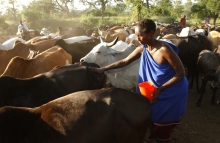 |
| Via ikrweb.wordpress.com/ |
Per the post, “while the pastoralists unanimously underlined the importance of BCPs, it was also quite evident that a lot of uncertainty still surrounds the concept and that undertaking the process is by no means easy or fast. It requires time, resources and commitment for it to be of value. Nevertheless, BCPs are a crucial and even essential tool – for groups of marginalised people that traditionally have not attached that much importance to land ownership and are now losing out rapidly.”
The blog post can be accessed here.
